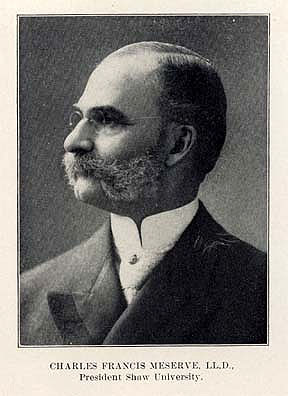Meserve, Charles Francis
15 July 1850–20 Apr. 1936
 Charles Francis Meserve, educator and author, was born at Abington, Plymouth County, Mass., the son of Charles, a shoemaker and farmer, and Susan Smith Blanchard Meserve. His forebear, Clement Meserve, a native of the Isle of Jersey, English Channel, came to America in 1673. A brother of Charles Francis was a longtime master of Bowdoin School in Boston. Meserve attended Waterville Classical Institute (later Coburn) for three years before enrolling at Colby College in Waterville, Maine, in 1873. He was graduated with an A.B. degree in 1877 and received an A.M. degree in 1880; Colby also awarded him an LL.D. degree in 1899.
Charles Francis Meserve, educator and author, was born at Abington, Plymouth County, Mass., the son of Charles, a shoemaker and farmer, and Susan Smith Blanchard Meserve. His forebear, Clement Meserve, a native of the Isle of Jersey, English Channel, came to America in 1673. A brother of Charles Francis was a longtime master of Bowdoin School in Boston. Meserve attended Waterville Classical Institute (later Coburn) for three years before enrolling at Colby College in Waterville, Maine, in 1873. He was graduated with an A.B. degree in 1877 and received an A.M. degree in 1880; Colby also awarded him an LL.D. degree in 1899.
Meserve began his professional career in Massachusetts as principal of the high school in Rockland (1877–85) and of Oak Street School in Springfield (1885–89). He then served as superintendent of the Haskell Institute, U.S. Training School for American Indians, in Lawrence, Kans., from 1889 to 1894. In the latter year he became president of Shaw University in Raleigh; his predecessors were Henry Martin Tupper (1831–93), who headed the institution from 1865 to 1893, and Nicholas Franklin Roberts (b. 1849), interim Black president for several months. Meserve remained president until 1919, at which time emphasis was placed on training teachers, clergymen, and physicians; thereafter, he was president emeritus. Meserve Hall on the campus was named for him.
A Baptist, Meserve was licensed to preach but was not ordained. From 1894 to 1897 he served on the board of directors of the North Carolina State School for the Deaf, Dumb, and Blind. A member of the Raleigh Natural History Club for thirteen years, he served as its vice-president and president (1931) and delivered several papers to the membership. In addition, Meserve was a member of Phi Beta Kappa and addressed educational groups. He was president for life of the Meserve Family Association as well as instrumental in founding Capon Springs Conference at Capon Springs, W.Va. He was the author of Abington's Part in the Building of a Great Commonwealth and several pamphlets on Indian affairs. Meserve was a Republican.
On 19 Dec. 1878 he married Abbie Mary Whittier, of Bangor, Maine, who died in Brookline, Mass., on 6 Oct. 1898, leaving one child, Alice Whittier Meserve. On 10 May 1900 he married Julia Frances Philbrick, of Waterville, who died in 1928. In 1907 his daughter Alice served as professor of Latin at Meredith College in Raleigh, and in 1936 she was a member of the faculty of Peace Institute (later College). Meserve was buried in Pine Grove Cemetery, Waterville, Maine.
References:
Alumni Secretary, Colby College (Waterville, Maine), to Grady L. E. Carroll, 12 Nov. 1974.
Moses Amis, Historical Raleigh (1913). https://archive.org/stream/historicalraleig00am#page/2/mode/2up (accessed September 24, 2014).
Samuel A. Ashe, ed., Biographical History of North Carolina, vol. 7 (1908). https://archive.org/details/biographicalhis06ashegoog (accessed September 24, 2014).
Hugh Victor Brown, A History of the Education of Negroes in North Carolina (1961).
Grady L. E. Carroll, They Lived in Raleigh (1977).
Wilmoth Carter, Shaw's Universe (1973).
Josephus Daniels, Editor in Politics (1941).
Frank E. Emory, ed., Paths toward Freedom (1976).
Mary Lynch Johnson, History of Meredith College (1972).
Ernest Cummings Marrimer, History of Colby College (1963).
Raleigh News and Observer, 21 Apr., 1 May 1936.
Elizabeth Culbreth Waugh and Editorial Committee, North Carolina's Capital: Raleigh (1967).
Additional Resources:
Whitted, J. A. 1908. A history of the Negro Baptists of North Carolina. Raleigh: Edwards & Broughton Print. Co.
Daniels, Josephus, and Charles F. Meserve. 1917. Josephus Daniels letter to Charles Francis Meserve.
Meserve, Charles F. 1896. The Dawes commission and the five civilized tribes of Indian Territory. Philadelphia: Office of the Indian rights Association.
Meserve, Charles F. 1894. A tour of observation among Indians and Indian schools: in Arizona, New Mexico, Oklahoma and Kansas. Philadelphia: Office of the Indian Rights Association.
Meserve, Charles F. 1930. Abington's part in the building of a great commonwealth and a powerful nation. [Place of publication not identified]: [publisher not identified].
Image Credits:
Whitted, J. A. 1908. A history of the Negro Baptists of North Carolina. Raleigh: Edwards & Broughton Print. Co. https://docsouth.unc.edu/church/whitted/ill21.html (accessed September 24, 2014).
1 January 1991 | Carroll, Grady L. E., Sr.